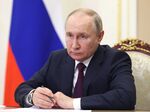The weekend rebellion, which resulted in Wagner leader Yevgeny Prigozhin retracting his troops’ push toward Moscow, has raised doubts about Putin’s ability to maintain control as the war in Ukraine continues unabated. German Chancellor Olaf Scholz speculated that Vladimir Putin had been ‘weakened.’
Putin’s hold on power has come under questioning following the weekend uprising, which concluded when Yevgeny Prigozhin, the leader of Wagner, decided to cease his troops’ advancement on Moscow.
Sharing his initial comprehensive remarks on the failed mutiny, Scholz expressed his belief that it would undoubtedly result in lasting consequences within Russia.
‘I do believe that he (Putin) is weakened,’ Scholz informed the public broadcaster ARD.
‘It shows that the autocratic structures, the power structures, have cracks and he in no way sits as firmly in the saddle as he always claims,’ the German leader stated.
Read also: Wagner Chief Calls Off March On Moscow, Agrees To Exile
‘But I don’t want to take part in speculation about how long he’ll stay in office — it could be a long time or short, we don’t know.’
According to Scholz, Germany and its Western allies will be closely monitoring subsequent developments.
‘Russia is a nuclear power, it is a very powerful country and that is why we have to watch very carefully when dangerous situations arise,’ he noted.
‘This was a dangerous situation and many are speculating about whether it is over. We don’t know either.’
In the aftermath of Russia’s invasion, Scholz reiterated Germany’s unwavering support for Ukraine and emphasised that any discussions on peace would be contingent on Moscow’s withdrawal of its troops.
‘Anything else would legitimise what’s happened,’ he said. ‘And that is why it can’t end up that the war is just frozen there where the line is between the various armies.’
He commented on the ambiguity surrounding the Wagner mutiny’s potential implications of bringing the war to an end, noting that it could either facilitate or hinder the process.
‘That is why it is important for Ukraine to do its part to make it (a resolution) possible — that is what it is trying to do with the current offensive. We’ll see how that develops.’
Scholz said Western allies were ‘supporting Ukraine so it can defend itself’ however, stressed thag ‘the goal of our support for Ukraine is not regime change in Russia’.
Germany, once believe to be cautious in terms of providing arms, has now emerged as the second-largest contributor of military aid to Ukraine, following closely behind the United States. This shift signifies a notable change in Germany’s stance towards supporting Ukraine’s defense capabilities.










